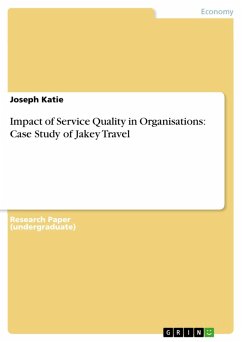Research Paper (undergraduate) from the year 2012 in the subject Leadership and Human Resource Management - Miscellaneous, grade: A, University of Plymouth, language: English, abstract: This report draws from relevant academic theories and models in evaluating the current situation at Jakey Travel. Having identified the underlying issues at the firm, suitable measures to improve service quality at the firm are recommended. 1. Impact of Service Quality on Customer Loyalty A careful assessment of relevant literature reveals plenty of empirical evidence in support of the proposition that service quality is a significant determinant of customer loyalty (Akbar et al., 2010). For example, in a recent study of the impact of service quality on customer loyalty in the context of retail outlets, Sainy (2010) demonstrated that the former has a strong, positive effect on the latter. Oliver (1981) contends that customer loyalty develops gradually and is not a result of a single experience. More specifically, Oliver (1981) asserts that consumers first become loyal in a cognitive sense, i.e., when they perceive the quality of a service delivered to them by an organisation as superior compared to its competitors, they consider the firm as a 'wise' choice over other alternatives. At the second stage is affective loyalty when the consumer develops a liking for the firm based on cumulatively satisfying service experiences. The third stage is conative loyalty whereby the consumer is committed to buying services from the same firm. This leads to the fourth stage, known as action loyalty, whereby the consumer exhibits consistent repurchase behaviour and engages in positive word - of - mouth communication about the firm.
Dieser Download kann aus rechtlichen Gründen nur mit Rechnungsadresse in A, B, BG, CY, CZ, D, DK, EW, E, FIN, F, GR, HR, H, IRL, I, LT, L, LR, M, NL, PL, P, R, S, SLO, SK ausgeliefert werden.


